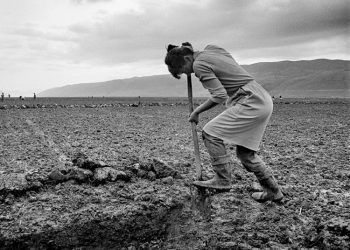By Taisa Batkina Pine
Part sixteen
Memorie.al/ publishes the unknown story of the Russian Taisa Batkina (Pine), originally from Tula, Russia, the third child of a very poor rural family, who was left an orphan at a very young age, after her father lost his life while working in one of the coal galleries on the outskirts of Tula, where he worked as a miner (shortly after escaping arrest, accused of “supporting the enemies of the people”) and she grew up with difficulty great economic, as their city continued to be under the bombardment of German forces, which had reached as far as near Kursk. Taisa graduated from the Faculty of Chemistry, near the ‘Lomonosov’ University of Moscow, where she met and married the Albanian student, Gaqo Pisha, originally from the city of Korça, who at that time was studying at the Faculty of Philosophy in Moscow and both together in 1957, they returned to Albania, together with their newborn son, Sasha, and began life in the city of Tirana, where Taisa was appointed as a professor of Chemistry at the State University of Tirana, while Gaqo, in the chair of Marxism- where they worked until 1976, when the State Security arrested Taisa Batkina on fabricated charges, accusing her of being a “Soviet KGB agent” and sentencing her to 16 years in political prison, which she suffered. in the “Women’s Prison” in the city “Stalin”, from where she was released in 1986, while her husband, Gaqo Pisha, had died in 1983, from a serious illness. The tragic story of Taisa Batkina (Pine), in the inhuman camps and prisons of Enver Hoxha’s communist regime, where she spent a decade of her life, along with many compatriots from the former Soviet Union, or other Eastern European countries, comes through her memories, published in a book entitled “We hoped and survived”, memories which, her son, Aleksandër Pisha, kindly offered her for publication, in Memorie.al
We hoped and survived
I dedicate it to the bright memory of my husband, GAQO PISHA
This is a book of memories. In it I want to tell about my life and the lives of my friends, Soviet women, who tried prison for several years just because they got the courage and got married and linked their fate with that of Albanian students. The prison was part of the great GULAG in the small Balkan country, Albania, where for many years the bloody communist regime of Enver Hoxha ruled, who was a loyal student of Stalin and a follower of his cause.
Through this book I would like everyone to learn about the inhuman trials we experienced and the horrible years we spent in Albanian prisons, just because we… fell in love! And let no one ever forgets what totalitarianism, despotism is and what the consequences of this system are.
Continued from the previous issue
About a month after his release, the so-called “diplomatic corps” in the camp, his representatives who lived in Tirana, asked us at the Internal Affairs Branch. We were greeted by a large boss, in a spacious office, sitting at a round table. We were asked how we were arranged. Many of us had no home, no problems with family and work. They promised to help us all. Suddenly, as if through it, we heard the question: “Do not any of you want to leave?” This was so unexpected that everyone shut their mouths. Some… most of us, had children, some were with men alive. What is this strange question? What had changed? We could have escaped before, but only without men and without children. Two women, who had no children, responded with fear, who were not opposed to fleeing. The lady asked: “Will you let me go with the boy? “Then I am ready.” The answer was: “Well, we will ask and we will give you the answer”! We came out extremely surprised; a ray of hope was raised in us! “Maybe we can really get away?” But we did not believe it because they thought that the authorities would never allow our children to come with us. The process of issuing permits to go abroad took a long time. Lonely women allowed them after a few months. The lady was tortured for a long time; sometimes they gave her permission, sometimes they returned her.
They finally let her go with the boy and they ran away. Meanwhile in the Soviet Union, changes had begun (Gorbachev’s famous Perestroika), while in Albania the changes were very slow and few. The place continued to be closed, with only a few elderly people allowed to visit their people in Greece and Yugoslavia. A little above I wrote about how difficult it was for Nina Puma, after her release from prison in the town of Rrëshen; they did not give her a job, they treated her family very badly. And she decided to leave, hoping that later, her husband would join them. But they did not allow him to take the two children; they only gave him the eldest son. Without the children they allowed Vola as well. In 1988, Sasha and I, decided to apply to flee, then he still had no family. Costa was married, he also had a daughter, Juna, and we thought they would let him take the family. The response to the request was: “You can make a request for the whole family”. We were overwhelmed, overjoyed, and launched the request. But permission was given only to me, without the children. ‘Susta’ was released again and again, sometimes tightened. We started another prayer, to allow all of us to leave Albania. The events in the Soviet Union and Eastern Europe at that time took place with vigor, this is known by all. Albania did not stand aside either; then she remembered the boiling cauldron. People, especially young people, found ways to enter foreign embassies and sought political asylum. The incumbents were terrified, especially by the events in Romania in 1989 and the assassination of Ceausescu.
In March 1990, we received permission to flee. We went to the Czech embassy, which also represented the interests of Soviet citizens in Albania, and submitted the documents along with the petition to return to the Soviet Union. There were 7 of us in total. In July 1990, events took place in Tirana that significantly influenced further developments in the country. On July 2, a colossal crowd of young people gathered near the street where many of the foreign embassies were located in Tirana. The mob took over the police fence and stormed the embassy grounds. The cops used sticks, guns. There were victims. To hide the presence of the victims, the next day it was allowed that whoever wanted, could enter the embassy and stay there. Then the doors of the embassies were closed again. Approximately 6,000 people gathered at the embassies of the FRY, France, Italy, and several other countries. For three weeks people lived there, sleeping on the streets awaiting the government decision. The whole country held its breath, everyone was afraid that the government would not allow those trapped in the embassy to leave the country, that they would be imprisoned. The case took the form of an international scandal. They finally allowed these people to leave Albania, gave them passports, buses, which they took and… in a long line start set off towards a new life. Meanwhile we were waiting for permission from the Soviet Union to enter the country. My sister tried her best to let us go back. This was neither easy nor simple. The sister had to knock on several doors, up to the Ministry of Foreign Affairs, to give guarantees that she would wait for us, would provide us financially. He finally got the permission. With the help and support of the Czech consul, whose behavior differed greatly from that of the rude and headstrong Soviet diplomats with whom I had encountered 30 years ago, on October 12, 1990, we boarded a plane and flew to Moscow. Finally, I stepped on my native land again, hugged my relatives and friends. I had been waiting for this moment for 30 years…! With me came to Russia and the boys with their families, but now times had changed. The Iron Curtain had fallen and we were confident that young people and their families would not experience the luck that I and my friends had experienced in a foreign land. After our departure, events took place in Albania that completely overthrew the regime of Enver Hoxha and enabled democratic elections, the release of all political internees and prisoners. But I did not witness these events, so I cannot write about them, I write only what I knew and saw myself. Such my people met me after 10 years!
“Diplomatic Corps”
“Diplomatic Corps”! This is how we called ourselves with a laugh. But in this joke there was a really good part. There were women prisoners from many places in the prison. One of these was Charlotte, the Frenchwoman, who had died shortly before I arrived at the camp. The women she was dating told me about her. Charlotte had come to Albania before the start of World War II, together with her husband from France. Charlotte’s husband had worked in the mine and retired early. They stopped in Saranda, a small, magnificent city on the shores of the Ionian Sea in southern Albania. There lived a close friend of Charlotte. There was no one in France and the small town among the flowers and citrus, he liked very much. Even after the war they stayed in Saranda, lived peacefully, did not suffer (they received a pension from France). Charlotte’s husband died and she was left alone. But they did not leave him alone. After some time the Albanian Security organs needed another spy… and elected Charlotte; he was arrested, tried and given 10 years in prison. The unfortunate woman was old and heartbroken. He soon died in prison. In the late ’60s, or early’ 70s, a large group was arrested in Albania, who were accused of espionage activities in the service of Poland… so called, “Polish spies”. Among those arrested were two Polish women (with Albanian men) and the husband of one of them. There were others who had studied in Poland, or just acquaintances of their own. The espionage case was fabricated and all were sentenced to long prison terms. The unfortunate women, after extremely serious investigation and trial, were taken to the camp. One of them was sentenced to 13 years, while the other 15 years in prison. Both were in very serious condition, especially she, who also had her husband in prison, sentenced to the same case to 25 years. Outside, he was left with two small children, who unexpectedly found themselves orphaned. But they were lucky.
The Polish government, when it learned of the arrest of its citizens, demanded their release. I do not know what measures the Polish government took, what pressure it exerted on the Albanian government. They said that if Poland stopped the unloading of coke coal in Albania, there may have been other austerity measures, but the fact remains, the Albanian government was forced to release the Poles. The order for their release came to the prison and within 24 hours, the Poles were released after spending a total of nearly 3 years in prison. However, when one of the detainees decided to return to Poland, she was not allowed to take her children with her. This is how the Albanian Security organs retaliated for the defeat. I inadvertently compared the attitude of Poland and the Soviet Union towards their citizens. Even in Poland the socialist order was, but the Polish government did not abandon its citizens, did not leave them at the mercy of fate, and defended their interests. The Soviet government did not react to our arrest. All the efforts of our relatives, all the prayers and letters went unanswered. Nobody wanted to know about us, about our fate. Human life in the Soviet Union had no value, no one cared about us! When we were in the camp, the “diplomatic corps” consisted of 13 Soviet women, 2 Yugoslavs, one Italian, one Romanian and one Hungarian. All of them were unfortunate women, without any guilt, women violated by the iron boot of the Albanian Security organs, separated from their children, men, who had lost their homes, families, goods and things. It was all their fault, or misfortune, that they fell in love with Albanians, married them and, in order not to ruin the family, did not leave Albania when this was still possible.
We never, even in our minds, imagined that such conditions would be created one day, when we would be arrested. But as the situation in the country changed, so did our attitude toward us. The constant persecution, trials, shootings, and internments these all these created an atmosphere of fear in the country. There were eavesdropping, spying, provocations everywhere, slandering all kinds of anti-state crimes. No one felt safe. Everyone felt suspicious, easy prey to reports, afraid to be reasonable, to think independently. Unfortunately, we, despite our desire, differed, just because we were foreigners. Many of us were fully integrated into the life of the country. Being the majority with higher education, we tried to give our contribution; we worked as doctors, pedagogues, engineers. We enjoyed the respect of colleagues, relatives, neighbors. In the late 1970s, xenophobia and spy mania began to rage in the country. Word was circulating, especially spread by the Security that we should not believe us, that very soon all foreign women would be expelled from Tirana and others like these. From 1974 to 1977, 13 people were arrested, 13 Soviet women. Those who remained free had their worries. Someone had arrested the man, deported them and their families, or transferred them to work in more remote districts. All of us who went to prison were associated with the same fate, the same misfortune, the same catastrophe; the fate of each of us was personal and tragic in its own way. Some of us even arrested men, children, interned family. Everyone experienced our misfortune in their own way. I will bring down the fates of some of us.
The fact that one endures something relatively easily, for another it is an unbearable burden. One is more patient, one stronger, another weaker, but everyone must be avenged; we could endure and survive, each with her own, because the conditions were different, the characters… but also life before prison.
Nadja
Nadje was arrested in 1974, earlier than any other. At that time she was living in Shkodra, in the North of Albania, with her husband and son. Nadja was open-minded, a woman with a light, cheerful character, she liked to dress nicely and, among other things, she stood out. Had come from Leningrad, engineer, and had graduated from the Leningrad Forest Academy. In Shkodra he worked in the Directorate of Forest Economy, in the branch of greenery. She worked well, they loved her, they respected her, and she had many friends. For Nadja, everything seemed to go well… And, suddenly the arrest, the loneliness, the interrogation sessions, the trial and the sentence of 8 years for agitation and propaganda. Nadje was taken to the camp. The family denied it; no one went to see it. The women told me that Nadja spent the whole day lying in bed, covered her head and feet with a blanket, not talking to anyone. In the old camp, there was almost no work. Prisoners spent days in barracks in very poor conditions, cramped, unclean, and rationed. We, who were still at large, learned of Nadja’s arrest, but knew nothing of her fate, of the accusation made against her, and hid our heads in the sand like ostriches, striving to find all sorts of reasons for Nadja’s arrest, reasons, that had nothing to do with us; we tried to convince ourselves that evil would pass us by, it would not touch us. The instinct of self-defense worked, which helped us to hope that everything would go well; he defended us even later, when upon us, one after the other, the heaviest blows of fate fell. We later learned that Nadja had been given 8 years “for agitation and propaganda”.
When I was arrested, I learned from my cellmate, who, as I later learned, was being held by the Security, terrified that Nadja had been arrested again, brought to the pre-trial detention center, and was setting up an espionage group. (I mentioned at the beginning that my neighbor was knocking on the cell next door and getting “data”). Sometime later, I was told that a spy group of five had been formed: three of my friends and two Albanians, who knew very little about them. After a thorough investigation and trial, Nadja was sentenced to 18 years in prison. They gave her such a long deadline also because she, allegedly, during the first investigation had hidden the espionage activity. As I said above, that Nadja worked in the Directorate of Forestry. At work, at her desk, she often found maps, which absolutely did not work for her, and she returned them without opening the envelopes. He was once sent to work. Nadja got on the bike and went where she was told. But they stopped him there; the place had been close up a closed military zone. Only when he was in prison, during the investigation, when he was accused of espionage, Nadja realized that they had provoked him, preparing “facts” for the possible accusation of espionage. Everything was planned and fabricated long before we were arrested. As the number of women arrested in Albania increased, the old women’s prison did not encourage all those arrested. A new prison was built, in a remote, isolated place. Around the prison was a large area of land. I told you, that our director loved the land, wanted to open gardens around the camp and a garden of ours and asked Nadja to deal with the cultivation and greening of the territory. On the side of the hill there was only earth and stones.
Nadja did the project, worked hard and did the job well, which was assigned to her. They cleared the hillsides of stones, planted grass, paved roads, and built flower beds. Nadja had her head full of projects. She sought to plant flowers along retaining walls, plant pine seedlings, and more. The director brought seedlings and seeds, gave him aids. The chiefs who came to the camp rejoiced, for the illusion of a good prison and of a happy life were created for the prisoners. They are allowed to enjoy the eye with colorful flowers, while on the walls hang banners and calls from the works of Enver Hoxha such as: “There is no mercy for the enemies” !, “We will never give up the class war”! I worked for many years with Nadja, we got along well with each other, we took care of the garden, and we cleaned the territory. Nadia’s energy, her work, optimism and sense of humor helped her survive. Her jokes helped us too, as if they were somewhat relieving the aggravated atmosphere. One evening, tired after work, we were getting ready for bed. It was winter and it was cold in the room without heating. Nadja was rolling around in bed, trying to wrap herself in blankets. The old, rusty bunk bed was creaking loudly. From the second floor of the bed Nina’s voice is suddenly heard: “Nadja, do not make noise”! “It’s my soul that scratches”! – was the answer. We all laughed and seemed to be relieved. Yes, our souls groaned, groaned, cried. We gritted our teeth and tried not to let these groans burst out.
To have some fun, we recalled old games, invented new ones, recounted what we had read long ago. Nadja remembered more and often told us stories, embellishing the stories with self-made jokes.
In the camp Nadja had an inseparable, Albanian friend. We all knew he had been put on the trail. Nadja used her services and made her brain butter. They had nothing to spy on us; we rarely spoke even when we were free, especially in prison. All the reports, which made for us a whole regiment of spies, were just fabrications, their slander. Throughout her years in prison, Nadja fought for her release, writing to all authorities that the lawsuit against her was fabricated. But he kept getting negative answers and writing to her again. From the first letter, which allowed her to be sent to her mother in Leningrad, Nadja wrote about her arrest. The mother, Eugenia Dmitrievna, a brave woman, immediately started the fight for the release of her daughter. He wrote to various instances and bodies, but received no response from anyone. From no one…! He tried to help Nadja through the Red Cross, but Albania in the sixties, had left this organization. Albanian communists could not accept that people imprisoned in their prisons receive help from anyone else. We also could not get help from our relatives. The Soviet Union was not allowed to send us money; the packages coming to Albania were charged with such a tax that we could not pay it, so we could not take it. Without tax we could only get vitamins.
Nadia’s mother constantly sent such packages to her daughter; in our life where hunger did not leave us, they were a great help to us; she encouraged Nadia, tried to calm her down, gave her hope, and that was very valuable. Like all of us, Nadja survived in all sorts of ways. He had a hard time without help, but he never lost his courage. Thus 12 years passed. 12 years she did not see her son. The boy stayed with his father and taught at the Teknikum. Nadja’s husband, fearing for himself and his son, would not let him meet his mother. The father could not bear it, he could not wait… he got married. Nadja’s son was left alone… like many of our children. Like the rest of us, Nadja was released with the second amnesty and returned to her son. A few years later he was able to secede from Albania and returned with his son to Russia, to St. Petersburg. She was lucky, found her mother alive and they spent 10 happy years together.
Our Lady
The lady was arrested a year before me. She was very friendly with Nadja. At the same time, Natasha, my fellow oil engineers, was arrested, and we realized that the case was very serious, and that none of us could be sure of ourselves, that a case was being fabricated against us, against Soviet women. Like all the rest of us, Our Lady was just a wife, just a mother, she taught Russian at the High School of Foreign Languages, she worked great. Her husband was a lecturer at the University of Tirana. They had only one son, Sasha. It seemed like everything was going well in their family; home, work, family…! And suddenly everything collapsed. The lady was cut off from ordinary, normal life and thrown into filthy solitude. Like all of us, she went through a serious investigation, and then was charged with espionage, included in the group they had fabricated themselves, along with Nadja and Nina, and sentenced to 15 years in prison. They did whatever they wanted with us; they turned us into spies, blaming us for undermining the foundations of the state. The accusations were just ridiculous, but that did not stop the government from judging us, torturing us, trampling on us, our families, and our lives. Our Lady’s husband, shortly after her arrest, without waiting for trial, broke up with her and soon married. The boy, who was 15 years old at the time, was left alone, dropped out of school (he taught excellently) and went to work in construction, although he did not enjoy good health, because as a child he had undergone heart surgery. This greatly affected Our Lady. Women who waited for visits, meetings, helping relatives, found it easier. The lady did not receive at least one letter from home, or any help. The son, scared by his father’s threats and the general tense situation, never came to meet the mother./Memorie.al
The next issue follows




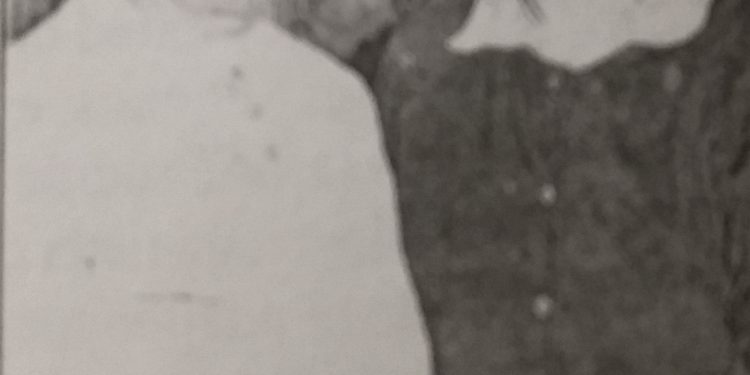
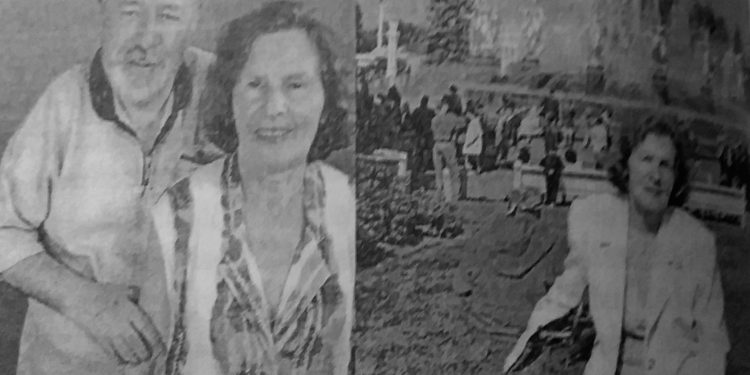
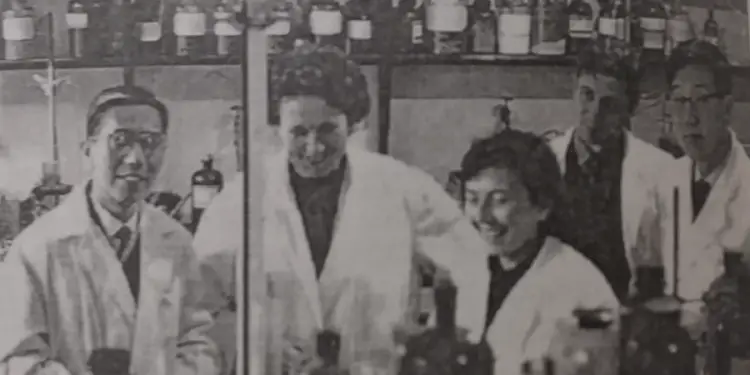
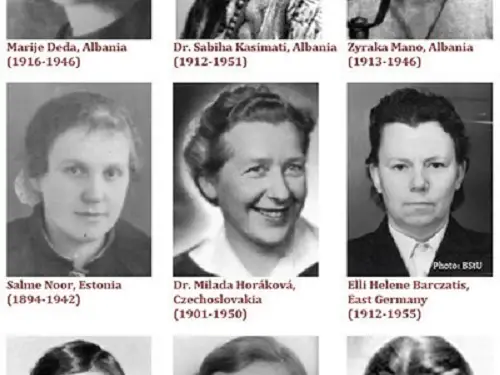
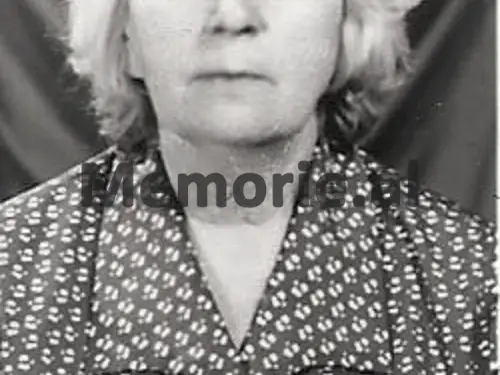
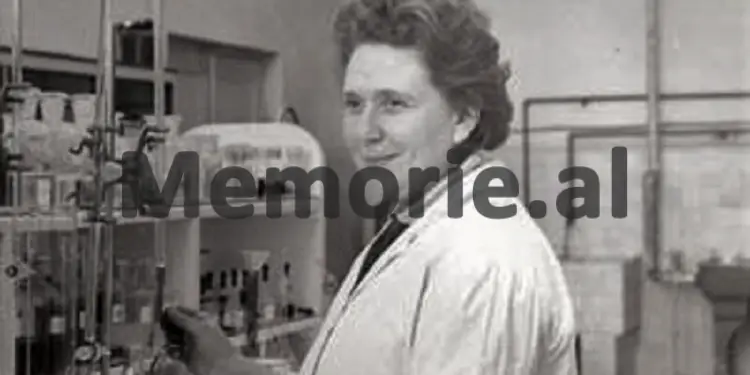
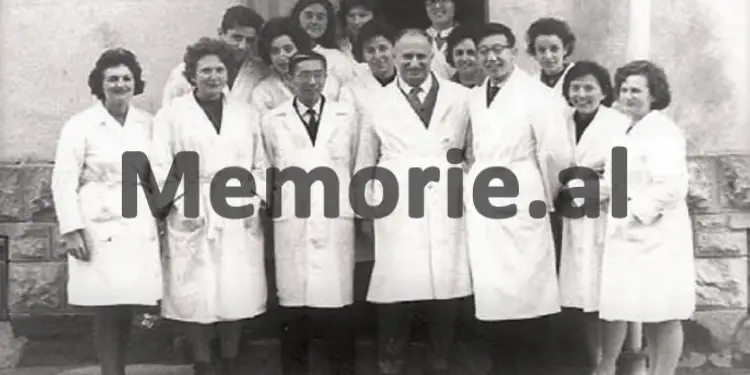

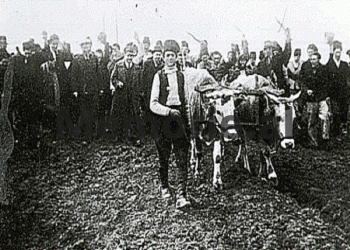
![“They have given her [the permission], but if possible, they should revoke it, as I believe it shouldn’t have been granted. I don’t know what she’s up to now…” / Enver Hoxha’s letter uncovered regarding a martyr’s mother seeking to visit Turkey.](https://memorie.al/wp-content/uploads/2026/01/Dok-1-350x250.jpg)

